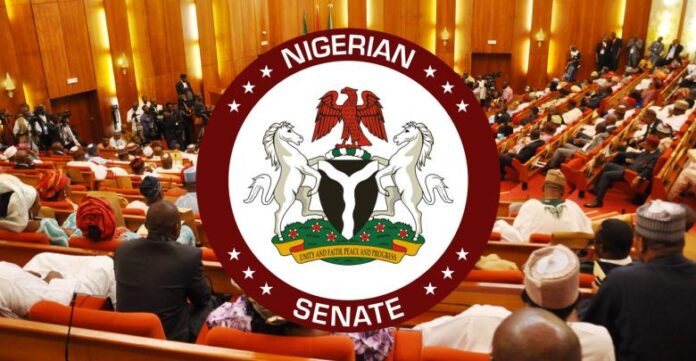.Reps reject life pension for Speaker, Senate President, others
.As Buhari writes Senate, seeks amendment of Section 84 (12) of Electoral Act
The Senate has approved financial autonomy for local government councils in the country.
This followed a voting on the report of the Senate Committee on the Review of the 1999 Constitution (Fifth Alteration) Bills, 2022 at Tuesday’s plenary.
Ninety-two senators voted in favour of the amendment, while two voted against it.
The upper chamber also approved financial autonomy for state legislature and judiciary, as 83 senators voted in its favour, while one senator voted against it.
Also, the lawmakers voted against life pension for presiding officers of the legislature, as 53 senators voted against the provision, while 34 voted in support.
The senators also rejected two bills aimed at overriding Presidential veto in Constitution alteration; and to override Presidential veto in respect of ordinary money bills.
The rejected bills required the mandatory four-fifth (votes of 88 Senators) and two-thirds majority (votes of 73 Senators) to pass, respectively.
The bill on Procedure for Overriding Presidential Veto in Constitutional Alteration sough to provide for the procedure for passing a constitution alteration bill where the President withholds assent.
On the other hand, the bill for an Act to alter the provisions of the Constitution to provide the procedure for overriding executive veto in respect of money bills, sought to provide for mode of exercising federal legislative power on money bills before the National Assembly.
While 94 senators registered to vote on the bill to override presidential veto in constitutional alteration, 79 lawmakers of the upper chamber voted in support while 15 voted against it.
The bill fell short of the needed 88 votes (four-fifth requirement) to pass.
On the bill to override presidential veto in respect of money bills, out of a total of 84 registered Senators, 44 voted in support, while 39 senators voted against the bill. The bill also fell short of the required two-thirds requirement (73 Senators) to pass.
In addition, the senate also rejected bills to provide for the Removal of Presiding Officers of the Legislature; and to Change the name of Barikin Ladi Local Government Area (LGA) of Plateau to “Gwol” LGA.
In another development, The House of Representatives has rejected the constitutional amendment that seeks to confer life pension on Senate President, Speaker and their Deputies.
The bill failed to get the required 240 votes as provided in the 1999 constitution as amended.
The bill got 193 ‘No’ votes, while 162 lawmakers voted in support of the bill.
There was wild jubilation from members of the House when the result came up on the screen.
Also, The Senate has received a letter from President Muhammadu Buhari seeking an amendment of section 84 (2) subsection 12 of the 2021 Electoral Act.
President Buhari wants the National Assembly to amend section 84 (2) Subsection 12 which states that no political appointee shall be a voting delegate or be voted for at the convention or congress of any political party for the purpose of the nomination of any candidate for an election.
In the letter, he said the amendment was necessary as the clause constituted a fundamental defect that could lead to the disenfranchisement of political officeholders.
President Buhari had on February 25 signed the Electoral Act Amendment Bill into law.
During the signing, he faulted Section 84 (12) of the Electoral Act, 2022.
The President said he believed the provision, as contained in the newly signed Act, constituted a fundamental defect as it conflicted with extant constitutional provisions.
He said the section disenfranchised serving political office holders from voting or being voted for at conventions or congresses of any political party, for the purpose of nomination of candidates for any election “in cases where it holds earlier than 30 days to the national election.”
President Buhari stressed that the provision introduced qualification and disqualification criteria that “ultra vires the Constitution by way of importing blanket restrictions to serving political officeholders.”
























